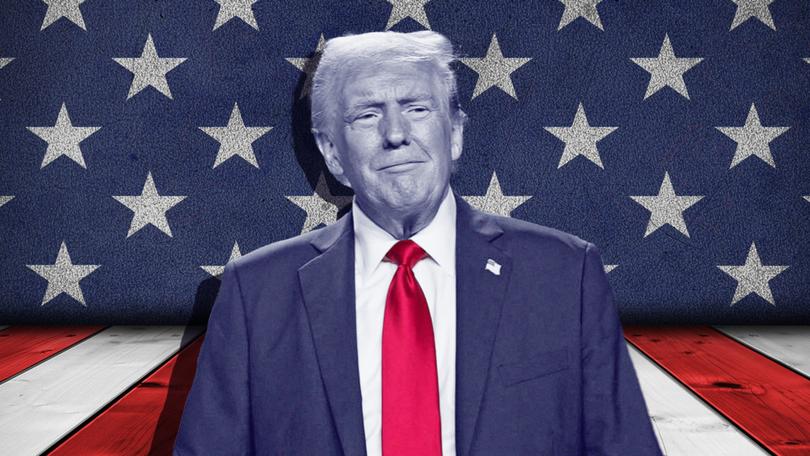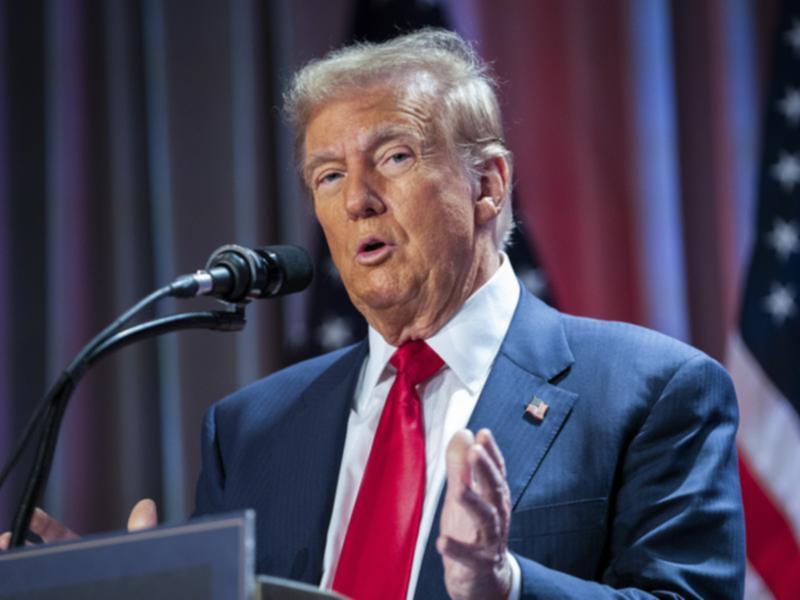THE WASHINGTON POST: A shadow Donald Trump foreign policy haunts Joe Biden’s final acts
Trump has challenged the oft-quoted adage of ‘one president at a time’ in new ways. Tweets and declarations that may or may not become policy have set some foreign governments on edge, while delighting others

President-elect Donald Trump’s threat Monday to impose a 25 percent tariff on imports from Canada and Mexico — one of a barrage of shots fired daily from Mar-a-Lago since his election victory — landed like a bombshell in Ottawa.
On Friday, after days of angst and an emergency “Team Canada” meeting with all 10 provincial premiers, Prime Minister Justin Trudeau jumped on a plane and flew to Palm Beach, Florida. He spent three hours at Trump’s Mar-a-Lago residence and golf club, one of 11 others crowded around Trump at a table in the middle of the busy members dining room.
David McCormick, the Republican senator-elect from Pennsylvania, posted a photo of the dinner on X, writing how “honored” he was to be there, and declaring they were ready to “shake things up” in Washington. He made no mention of Trudeau’s presence among them.
Sign up to The Nightly's newsletters.
Get the first look at the digital newspaper, curated daily stories and breaking headlines delivered to your inbox.
By continuing you agree to our Terms and Privacy Policy.In a Truth Social post Saturday, Trump called the meeting “very productive.” He said Trudeau had made a commitment to “work with us” on the border, trade and other issues that “I will be addressing on my first days back in Office, and before.”
But for Trudeau, who faces an election next year, the mission to Mar-a-Lago was unfavorably compared at home to Mexican President Claudia Sheinbaum, who instead struck back at Trump with a letter threatening counter-tariffs.
While Canada spent the week stewing, attention in Trumpworld had already moved on.
The president-elect made appointments to his economic team and announced more plans to dismantle the “deep state.” Just days after he threatened the United States’ top two trading partners via social media, he posted an AI-generated video of him popping out of a turkey and dancing on President Joe Biden’s Thanksgiving table.
This hyperactive flow of events during the transition has overshadowed the reaction of outsiders to Trump’s pronouncements and their impact - intended or not - on other international actors.
In Israel, Trump’s strong support for Prime Minister Benjamin Netanyahu and supposedly leaked accounts of their post-election conversations have led to widespread speculation there that the new cease-fire deal with Lebanese militant group Hezbollah was less a result of painstaking diplomacy by Biden’s emissaries than a giveaway to lighten Trump’s load once he takes office. There are similar suggestions that Netanyahu will continue to stymie Biden’s efforts to end the conflict in Gaza to let the new U.S. president declare a diplomatic victory after his inauguration on Jan. 20.
In Ukraine, there is consternation that Trump has said he will immediately seek to negotiate a peace agreement that will probably allow Russia to continue occupying parts of its neighbor. The prospect of a deal has led many to suspect Biden’s timing in finally lifting restrictions on Ukraine’s use of U.S. weapons and shoveling as much money as possible into military assistance for Kyiv before the new administration takes over.
Trump has challenged the oft-quoted adage of “one president at a time” in new ways. Tweets and declarations that may or may not become policy have set some foreign governments on edge, while delighting others. Traditions and standards to ensure the smooth transfer of power - ethics agreements, expressions of fealty to treaties and international agreements, FBI vetting of nominees for senior positions - have been ignored.
During his first transition, Trump’s team regularly released lists of dozens of foreign leaders he spoke with. This time around, such announcements have been few and sporadic.
“The last time, they … wanted to show how important they were,” said Philip Zelikow, a former diplomat and presidential scholar who helped manage George W. Bush’s first transition. “They’re not so insecure about that this time. They don’t need to say ‘See, world leaders call me.’”

Trump made no secret of his foreign policy plans during his 2024 campaign, but it’s been hard to read a transition team that has felt little apparent need to explain actions such as an apparent secret meeting between Trump confidant Elon Musk and Iran’s top U.N. diplomat or reported conversations between Trump and Russian President Vladimir Putin.
At the same time, Musk - who has been on the line during Trump phone calls with foreign leaders such as Ukrainian President Volodymyr Zelensky - has shown little inclination to hold his tongue on other matters that could affect security relationships. In social media posts over the past week, he ridiculed “idiots [who] are still building manned fighter jets like the F-35,” the newest generation U.S. combat aircraft that has been purchased by a number of U.S. allies and partners. Calling the planes “obsolete” in the “age of drones,” he suggested they were useful only in “helping Air Force officers get laid.”
Despite the bawdy tone, neither a newcomer’s attempts to undercut the incumbent’s policies, nor an incumbent’s efforts to straitjacket an incoming administration’s plans are new in the history of presidential transitions. As vice president-elect a week before Barack Obama replaced Bush, Biden traveled to the wartime hot spots of Afghanistan and Pakistan for policy meetings with local leaders and U.S. military commanders.
The Obama administration cried foul when Trump, just a month before his first inauguration, fired off email and social media demands that it veto a U.N. resolution denouncing Israeli settlements in the West Bank. Obama didn’t listen: The United States abstained, allowing the symbolic measure to pass.
Just as Biden is now trying to lock in policies in Ukraine and the Middle East, Trump, in the final days of his first term, put Cuba back on the list of state sponsors of terrorism, declared China guilty of genocide against the Uyghurs, tried to expand the U.S. relationship with Taiwan and designated Yemen’s Iran-backed Houthis a terrorist organization - all designed to thwart Biden campaign promises.
Both friends and foes have traditionally tried to get ahead of an upcoming U.S. power shift. At the end of the Harry S. Truman administration, as his Secretary of State Dean Acheson wrote in a memoir, foreign representatives “treated us with the gentle and affectionate solicitude that one might show to the dying, but asked neither help nor advice nor commitment for a future we would not share with them.”
Decades later, Henry Kissinger observed that during the final days of any administration, foreign governments “reserve their best efforts and their real attention for the new teams.”
But unlike Michael Flynn, the national security adviser Trump fired just weeks after his first inauguration for lying to the FBI about transition talks with Russia’s U.S. ambassador, Kissinger was careful to make official records of at least two conversations he held with a Soviet diplomat during the transition from the Democratic administration of Lyndon B. Johnson to Republican Richard M. Nixon.
“Boris Sedov, officially counselor of the Soviet Embassy, but in fact a member of Soviet intelligence, called on me today at his request,” Kissinger wrote in a Jan. 2, 1969 memo now in the archives of the State Department Historian. Subjects of that discussion, he wrote, included a U.S. warning against “surprises” in the Middle East, Vietnam, strategic arms talks and even a Soviet suggestion for Nixon’s inaugural address.
In recent weeks, Rep. Michael Waltz (R-Florida), Trump’s newly designated national security adviser, has spoken out on a number of occasions about current foreign policy issues, claiming that some adversaries are already shaking in their boots over Trump’s reoccupation of the Oval Office. Dubbing it “The Trump Effect,” Waltz wrote on X that “dictators” in Venezuela, Nicaragua and Cuba were panicking. “This is what leadership looks like,” he said.
After the International Criminal Court issued arrest warrants for Netanyahu and former Israeli defense minister Yoav Gallant 10 days ago, Waltz warned: “You can expect a strong response to the antisemitic bias of the ICC and UN come January.” When a Biden-negotiated cease-fire in Lebanon was announced this week, Waltz declared: “Everyone is coming to the table because of President Trump.”
Sen. Marco Rubio (R-Florida), Trump’s pick for secretary of state, has had at least one phone conversation with Secretary of State Antony Blinken, but the two have yet to sit down together. The Trump team’s refusal to sign transition and ethics documents or submit to FBI vetting has prevented current national security officials from sharing classified briefings with Trump officials without existing security clearances.
But Waltz this week dismissed any suggestion that Trump was conducting a shadow foreign policy. Biden national security adviser “Jake Sullivan and I have had discussions,” he said on “Fox News Sunday.” “For our adversaries out there that think this is a time of opportunity, that they can play one administration off the other, they’re wrong, and we are hand-in-glove. … We are one team.”
© 2024 , The Washington Post
